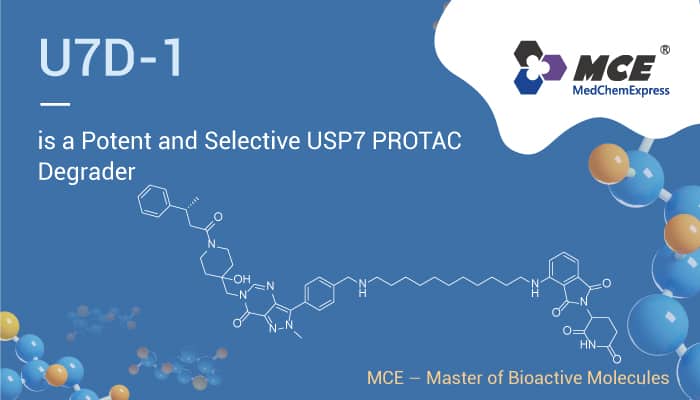Ubiquitin-specific proteinase 7 (USP7) is a kind of de ubiquitination enzyme (DUB), which can remove ubiquitin and protect substrate protein from degradation. Besides, the full activity of USP7 requires the C-terminal Ub-like domain to fold back to the catalytic domain. Moreover, this allows the active site to be remodeled into a catalytic active state through the C-terminal peptide. USP7, also known as HAUSP, is a kind of ubiquitination enzyme. Furthermore, it aims to stabilize the carcinogenic E3 ubiquitin ligase MDM2 that promotes the degradation of the p53 protein body. USP7 exists in a variety of protein complexes, many of which contain E3 ligases and their targets.
Specifically, many proteins are substrates of USP7 and play key roles in the cell cycle, DNA repair, chromatin remodeling, and epigenetic regulation. The abnormal activation or overexpression of USP7 may promote tumorigenesis and viral diseases. Importantly, this makes it the target of therapeutic intervention. Meanwhile, USP7 also abnormally activates Wnt signaling pathway and stabilizes HIF-1 α To promote carcinogenesis. These findings suggest that USP7 may induce tumor progression and become a therapeutic target. Here, we will introduce a first-in-class potent and selective USP7 PROTAC degrader, U7D-1.
U7D-1 is a Potent and Selective USP7 PROTAC Degrader.

Above all, U7D-1 is a selective USP7 PROTAC degrader, with a DC50 of 33 nM in RS4;11 cells. Nonetheless, U7D-1 shows anticancer activity. U7D-1 induces apoptosis in Jeko-1 cells.
Next in importance, U7D-1 induced USP7 degradation in RS4;11 cells, reducing the USP7 protein level by 83.2% at 1 μM. Particularly, U7D-1 shows anti-proliferative activity in p53 wild-type cell lines. Obviously, U7D-1 maintains potent cell growth inhibition in p53 mutant cancer cells.
Once again, U7D-1 upregulates the level of p53 and p21 proteins in a time-dependent manner. Interestingly, it induces cleavage of caspase-3 in the Jeko-1 cell line in a time-dependent manner. Additionally, U7D-1 up-regulates the expression of apoptotic-related genes and down-regulates the expression of E2F-related genes in Jeko-1 cells.
All in all, U7D-1 is a first-in-class potent and selective USP7 PROTAC degrader.
References:
Pei Y, et al. Angew Chem Int Ed Engl. 2022 Aug 15;61(33):e202204395.